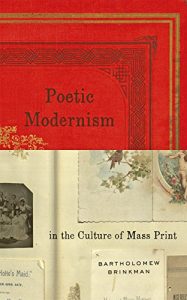In Poetic Modernism in the Culture of Mass Print, Bartholomew Brinkman argues that an emerging mass print culture conditioned the production, reception, and institutionalization of poetic modernism from the latter part of the nineteenth century through the middle of the twentieth century—with lasting implications for the poetry and media landscape. Drawing upon extensive archival research in the United States and Britain, Brinkman demonstrates that a variety of print collecting practices—including the anthology, the periodical, the collage poem, volumes of selected and collected poems, and the modern poetry archive—helped structure key formal and institutional sites of poetic modernism.
Brinkman focuses on the generative role of book collecting practices and the negotiation of print ephemera in scrapbooks. He also traces the evolution of the modern poetry archive as a particular case of the mid-twentieth-century rise of literary archives and identifies parallels between the beginning of mass print culture at the end of the nineteenth century and the growth of digital culture today. Advocating for a transatlantic modernism that stretches roughly from 1880 to 1960—one that incorporates both popular and canonical poets—Brinkman successfully extends the geographical, historical, and vertical dimensions of modernist studies.
Poetic Modernism in the Culture of Mass Print will appeal not only to scholars and students of literary modernism, modern periodical studies, book history, print culture, media studies, history, art history, and museum studies but also to librarians, archivists, museum curators, and information science professionals.






